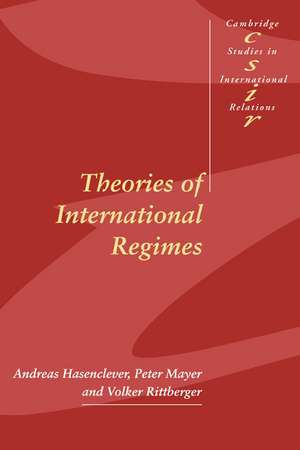Theories of International Regimes: Cambridge Studies in International Relations, cartea 55
Autor Andreas Hasenclever, Peter Mayer, Volker Rittbergeren Limba Engleză Paperback – oct 1997
| Toate formatele și edițiile | Preț | Express |
|---|---|---|
| Paperback (1) | 285.93 lei 6-8 săpt. | |
| Cambridge University Press – oct 1997 | 285.93 lei 6-8 săpt. | |
| Hardback (1) | 780.02 lei 6-8 săpt. | |
| Cambridge University Press – oct 1997 | 780.02 lei 6-8 săpt. |
Din seria Cambridge Studies in International Relations
-
 Preț: 200.78 lei
Preț: 200.78 lei -
 Preț: 190.01 lei
Preț: 190.01 lei -
 Preț: 198.89 lei
Preț: 198.89 lei -
 Preț: 210.69 lei
Preț: 210.69 lei -
 Preț: 200.85 lei
Preț: 200.85 lei -
 Preț: 232.37 lei
Preț: 232.37 lei -
 Preț: 237.58 lei
Preț: 237.58 lei - 8%
 Preț: 401.23 lei
Preț: 401.23 lei -
 Preț: 229.56 lei
Preț: 229.56 lei -
 Preț: 265.70 lei
Preț: 265.70 lei -
 Preț: 200.08 lei
Preț: 200.08 lei -
 Preț: 207.81 lei
Preț: 207.81 lei -
 Preț: 158.77 lei
Preț: 158.77 lei -
 Preț: 162.49 lei
Preț: 162.49 lei -
 Preț: 231.47 lei
Preț: 231.47 lei - 11%
 Preț: 584.77 lei
Preț: 584.77 lei -
 Preț: 241.77 lei
Preț: 241.77 lei -
 Preț: 287.87 lei
Preț: 287.87 lei -
 Preț: 209.12 lei
Preț: 209.12 lei -
 Preț: 299.22 lei
Preț: 299.22 lei -
 Preț: 286.13 lei
Preț: 286.13 lei -
 Preț: 287.87 lei
Preț: 287.87 lei - 11%
 Preț: 641.67 lei
Preț: 641.67 lei - 11%
 Preț: 585.78 lei
Preț: 585.78 lei - 14%
 Preț: 843.23 lei
Preț: 843.23 lei -
 Preț: 303.80 lei
Preț: 303.80 lei -
 Preț: 284.78 lei
Preț: 284.78 lei -
 Preț: 279.76 lei
Preț: 279.76 lei -
 Preț: 285.75 lei
Preț: 285.75 lei -
 Preț: 324.24 lei
Preț: 324.24 lei -
 Preț: 290.16 lei
Preț: 290.16 lei -
 Preț: 291.69 lei
Preț: 291.69 lei -
 Preț: 392.52 lei
Preț: 392.52 lei -
 Preț: 315.99 lei
Preț: 315.99 lei
Preț: 285.93 lei
Nou
Puncte Express: 429
Preț estimativ în valută:
54.71€ • 57.24$ • 45.45£
54.71€ • 57.24$ • 45.45£
Carte tipărită la comandă
Livrare economică 02-16 aprilie
Preluare comenzi: 021 569.72.76
Specificații
ISBN-13: 9780521598491
ISBN-10: 0521598494
Pagini: 264
Ilustrații: 2 tables
Dimensiuni: 152 x 229 x 15 mm
Greutate: 0.41 kg
Ediția:New.
Editura: Cambridge University Press
Colecția Cambridge University Press
Seria Cambridge Studies in International Relations
Locul publicării:Cambridge, United Kingdom
ISBN-10: 0521598494
Pagini: 264
Ilustrații: 2 tables
Dimensiuni: 152 x 229 x 15 mm
Greutate: 0.41 kg
Ediția:New.
Editura: Cambridge University Press
Colecția Cambridge University Press
Seria Cambridge Studies in International Relations
Locul publicării:Cambridge, United Kingdom
Cuprins
List of figures and tables; Acknowledgments; 1. Introduction: three perspectives on international regimes; 2. Conceptual issues: defining international regimes; 3. Interest-based theories: political market failure, situation and problem structures, and institutional bargaining; 4. Power-based theories: hegemony, distributional conflict and relative gains; 5. Knowledge-based theories: ideas, arguments and social identities; 6. Conclusion: prospects for synthesis; References; Index.
Recenzii
'The strengths of the book are its clarity, accessibility and ordered structure and the breadth of literature which it covers in a convincing manner. This is an important book within the field, reflecting on its place in the discipline of international relations and searching for an identity, and is all the more interesitng for it.' Peter Newell, International Affairs
Descriere
The authors examine three different theoretical approaches to international regimes: realism, neoliberalism and cognitivism.












